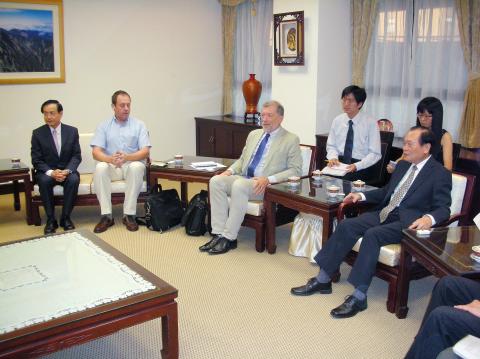Taipei Mayor Hau Lung-bin (郝龍斌) yesterday said he would consider visiting former president Chen Shui-bian (陳水扁) if he is sent to a hospital in Taipei for treatment, after Taoyuan General Hospital suggested that Chen should be transferred to a major medical center for further check-ups.
Hau, who has expressed support for granting Chen medical parole, said yesterday that his stance on the issue had not changed, adding that a medical team should assess Chen’s condition.
In a question-and-answer session at the Taipei City Council yesterday, Democratic Progressive Party (DPP) Taipei City councilors applauded Hau for his support on the issue and called on the mayor to provide security for the former president if he is sent to a medical center in Taipei.

Photo: Hsiang Cheng-chen, Taipei Times
“Of course I will consider [visiting Chen if he is sent to a Taipei medical center]. It’s not my authority to decide whether Chen should receive medical treatment in Taipei, but if he is sent to a hospital in this city, I believe related agencies and the hospital would take care of his safety,” he said in response to a question from DPP Taipei City Councilor Tung Chung-yen (童仲彥).
DPP Taipei City councilors Wang Shih-chien (王世堅), Chuang Rui-hsiung (莊瑞雄) and Chiang Chih-ming (江志銘), among others, thanked Hau and said his proposal would help improve relations between the pan-blue and pan-green camps.
However, New Party Taipei City Councilor Vivian Huang (黃珊珊) questioned Hau’s motives, alleging that the mayor had made the proposal for political gain, while acknowledging that Hau’s endorsement of Chen’s medical parole would boost his support.
“You are one of the Chinese Nationalist Party’s [KMT] potential 2016 presidential candidates, and your next step after stepping down in 2014 is under great scrutiny. We all know that the endorsement will certainly make you popular among pan-green supporters,” she said.
Hau said his endorsement of Chen’s medical parole had nothing to do with the 2016 presidential elections.
Separately yesterday, human rights activists Hans Wahl and Harreld Dinkins visited Minster of Justice Tseng Yung-fu (曾勇夫) at the -ministry, accompanied by DPP legislators Mark Chen (陳唐山) and Hsu Tain-tsair (許添財), as well as Taiwan Solidarity Union legislators Hsu Chung-hsin (許忠信) and Lin Shih-chia (林世嘉).
Jack Healey, director of the Washington-based Human Rights Action Center, who was scheduled to lead the group of visitors, said in a press statement that he was unable to attend the visit because he had the flu.
Wahl and Dinkins, who visited the former president at Taoyuan General Hospital on Monday, held a closed-door meeting with Tseng.
According to the ministry, the two human rights activists met Tseng to learn about the state of Chen Shui-bian’s health and the conditions of his imprisonment.
Meanwhile, Taoyuan General Hospital yesterday said it had arranged for Chen Shui-bian to undergo a neck ultrasound test and an eye exam.
On Friday, the hospital had found a 4mm-by-4mm trace of cerebral vascular trauma in his right frontal lobe, possibly indicating the former president had a minor stroke.
DPP Legislator Chen Chi-mai (陳其邁), who is a former Chang Guan Memorial Hospital doctor and who also visited the former president at the hospital, said during a political talk show on TV on Monday evening that there was not one, but seven or eight instances of cerebral vascular trauma, in Chen Shui-bian’s frontal lobe
Chen Shui-bian, who is serving a 17-and-a-half-year sentence for corruption, was sent to Taoyuan General Hospital last Wednesday night after complaining of pain when urinating and was admitted for extensive examinations.

Taiwan would welcome the return of Honduras as a diplomatic ally if its next president decides to make such a move, Minister of Foreign Affairs Lin Chia-lung (林佳龍) said yesterday. “Of course, we would welcome Honduras if they want to restore diplomatic ties with Taiwan after their elections,” Lin said at a meeting of the legislature’s Foreign Affairs and National Defense Committee, when asked to comment on statements made by two of the three Honduran presidential candidates during the presidential campaign in the Central American country. Taiwan is paying close attention to the region as a whole in the wake of a

President William Lai (賴清德) has appointed former vice president Chen Chien-jen (陳建仁) to attend the late Pope Francis’ funeral at the Vatican City on Saturday on his behalf, the Ministry of Foreign Affairs said today. The Holy See announced Francis’ funeral would take place on Saturday at 10am in St Peter’s Square. The ministry expressed condolences over Francis’ passing and said that Chen would represent Taiwan at the funeral and offer condolences in person. Taiwan and the Vatican have a long-standing and close diplomatic relationship, the ministry said. Both sides agreed to have Chen represent Taiwan at the funeral, given his Catholic identity and

Chinese Nationalist Party (KMT) Chairman Eric Chu (朱立倫), spokeswoman Yang Chih-yu (楊智伃) and Legislator Hsieh Lung-chieh (謝龍介) would be summoned by police for questioning for leading an illegal assembly on Thursday evening last week, Minister of the Interior Liu Shyh-fang (劉世芳) said today. The three KMT officials led an assembly outside the Taipei City Prosecutors’ Office, a restricted area where public assembly is not allowed, protesting the questioning of several KMT staff and searches of KMT headquarters and offices in a recall petition forgery case. Chu, Yang and Hsieh are all suspected of contravening the Assembly and Parade Act (集會遊行法) by holding

Lawmakers from the Democratic Progressive Party (DPP) yesterday established a friendship group with their counterparts in Ukraine to promote parliamentary exchanges between the two countries. A ceremony in Taipei for the Taiwan-Ukraine Parliamentary Friendship Association, initiated by DPP Legislator Chen Kuan-ting (陳冠廷), was attended by lawmakers and officials, including Deputy Minister of Foreign Affairs Francois Wu (吳志中) and European Economic and Trade Office in Taiwan Director Lutz Gullner. The increasingly dire situation in Ukraine is a global concern, and Taiwan cannot turn its back when the latter is in need of help, as the two countries share many common values and interests,